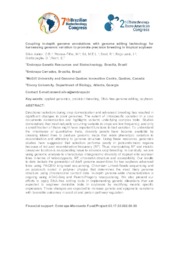Coupling in-depth genome annotations with genome editing technology for harnessing genomic variation to promote precision breeding in tropical soybean.
Coupling in-depth genome annotations with genome editing technology for harnessing genomic variation to promote precision breeding in tropical soybean.
Author(s): SILVA JUNIOR, O. B. da; PESSOA FILHO, M. A. C. de P.; SA, M. E. L.; DEAL, R.; RAGOUSSIS, I.; GRATTAPAGLIA, D.; RECH FILHO, E. L.
Summary: ABSTRACT: Directional selection during crop domestication and advanced breeding has resulted in significant changes in plant genomes. The extent of intraspecific variation in a crop documents domestication and highlights variants underlying complex traits. Studies demonstrate that most naturally occurring variants in crops are low frequency, and only a small fraction of those might have important functions to trait variation. To understand the inheritance of quantitative traits, diversity panels have become available by crossing inbred lines to produce genomic maps that relate phenotypic variation to recombination and ultimately to genome structure. Using these resources, genomics studies have suggested that selection performs poorly in pericentromeric regions because of reduced recombination frequency (RF). Thus, manipulating RF and meiotic crossover location is an appealing issue to advance crop breeding. In our study, we are using genomic analysis to characterize intragenomic diversity of tropical elite soybean lines in terms of heterozygosity, RF, chromatin structure and accessibility. Our results to date include the generation of draft genome assemblies for two soybean advanced lines using PACBIO long-read sequencing, Chromium Linked-Reads sequencing and an approach rooted in polymer physics that determines the most likely genome structure using chromosomal contact data. In-depth genome-wide characterization is ongoing using ATAC-Seq and Parent-Progeny resequencing. We also present our efforts to apply DNA-free editing tools in implementing genetic alterations that are expected to engineer desirable traits in soybeans by modifying meiotic specific expression. These changes are expected to increase genetic and epigenetic variations with favorable outcomes in seed oil and protein pathway regulation. Financial support: Embrapa-Monsanto Fund/Project:03.17.03.002.00.00
Publication year: 2018
Types of publication: Abstract in annals or event proceedings
Unit: Embrapa Cerrados
Observation
Some of Embrapa's publications are published as ePub files. To read them, use or download one of the following free software options to your computer or mobile device. Android: Google Play Books; IOS: iBooks; Windows and Linux: Calibre.
Access other publications
Access the Agricultural Research Database (BDPA) to consult Embrapa's full library collection and records.
Visit Embrapa Bookstore to purchase books and other publications sold by Embrapa.

